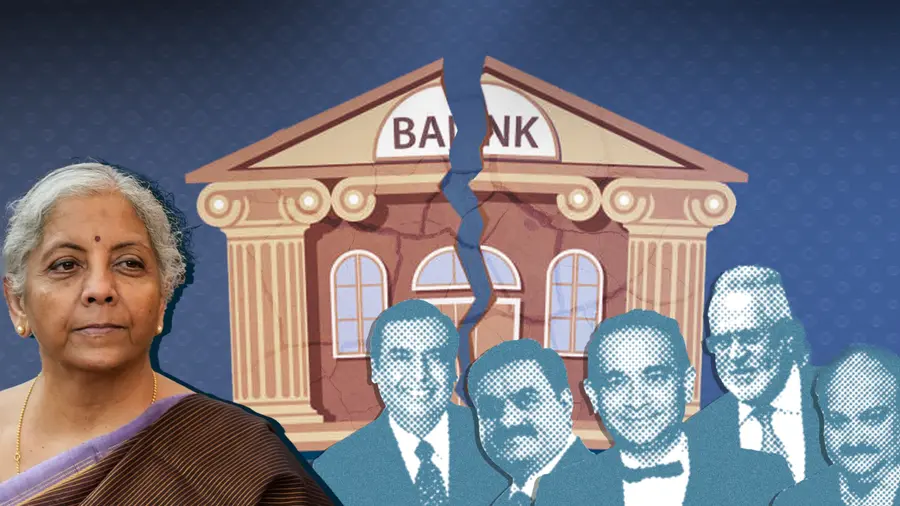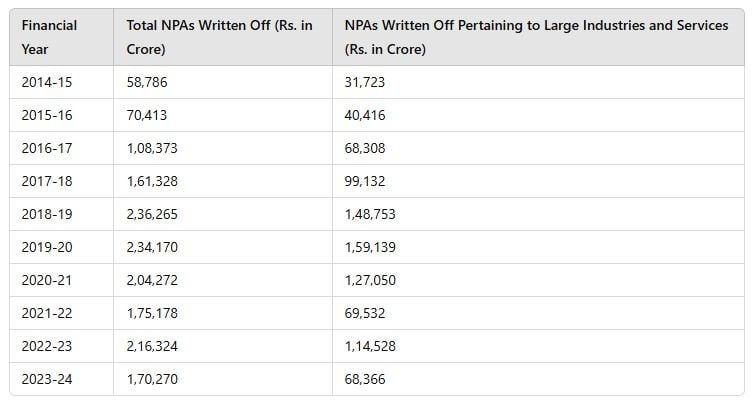Economy
The Great Corporate Heist: How Taxpayers Foot the Bill for Billionaire Bailouts

Anusha Paul
Published on Mar 19, 2025, 09:56 PM | 7 min read
The union government's handling of non-performing assets (NPAs) and corporate defaults under the Insolvency and Bankruptcy Code (IBC) has led to staggering losses for banks, resulting in a massive financial drain on public money. In response to a starred question raised by A A Rahim, Member of Parliament in the Rajya Sabha, Union Finance Minister Nirmala Sitharaman disclosed the results of the IBC’s operations, which have resolved 1,119 cases and generated 3.58 lakh crore in recoveries for creditors. However, this figure masks a far more disturbing reality of the immense haircuts suffered by the banks, which have resulted in the public ultimately bearing the brunt of these losses.
An Ambani Sponsored Loss for Taxpayers
The IBC has been involved in resolving cases, but the losses faced by banks are staggering. The process, touted as a solution to India’s mounting bad loan crisis, has led to haircuts of astronomical proportions. One of the most controversial examples of this was the debt resolution of Reliance Communications (RCOM), owned by Anil Ambani. The National Company Law Tribunal (NCLT) admitted a debt claim of 47,251 crore, a large portion of which was owed to banks. In what can only be seen as a masterstroke of corporate maneuvering, Mukesh Ambani swooped in to acquire RCOM from his brother Anil for a paltry 456 crore. This deal, which accounted for a mere 0.92% of the admitted debt, led to a massive 99.2% haircut, leaving banks with a massive loss of 46,795 crore.
While the Finance Minister emphasized that the IBC process is "market-driven" and that there is no concept of a “loan waiver” within its framework, the reality of these haircuts paints a very different picture, one in which banks and ultimately taxpayers bear massive losses. The latest data, from the Insolvency and Bankruptcy Board of India (IBBI), shows that for the October-December 2024 quarter, the recovery rate on bank claims stood at just 31%, with a hair-raising 69% haircut. In total, the claims by banks under the IBC amounted to 11.39 lakh crore, suggesting a loss of around 8 lakh crore in a single year.
These losses have led to concerns about the efficacy of the IBC and its ultimate burden on taxpayers. With the banking sector already reeling from bad debts, these huge write-offs reflect a growing crisis in public finances. Banks are required to take these massive losses, but where does this money ultimately come from? The taxpayers, who have to support state-owned banks, find themselves footing the bill for the corporate defaults that have been allowed to continue unchecked.
The Scale of the Crisis
According to the Reserve Bank of India’s (RBI) Trends and Progress of Banking in India report for 2023-24, banks referred 1,004 cases to the NCLT in FY 2023-24, involving 1.63 lakh crore in debt. Yet, banks recovered only 46,340 crore—merely 28.3% of the total amount—leading to a massive 71.7% haircut, which resulted in a loss of 1,17,603 crore for the year. This means that despite the government’s assurances of enforcing a "market-driven" resolution process, banks are being forced to write off vast amounts of bad loans!
The sheer scale of loan write-offs becomes even clearer when we look at a decade’s worth of data. Between April 2014 and September 2024, Indian banks wrote off an astounding 16.61 lakh crore in bad loans. However, the recovery from these loans has been atrociously low. Banks managed to recover only 2.69 lakh crore, which amounts to a meager 16% of the total written-off amount. The rest of the burden falls on taxpayers, who continue to see their public sector banks flounder under the weight of corporate defaults and the government's failure to enforce accountability.
NPA Write-Offs in Numbers (2014–2024)
The total amount of NPAs written off by scheduled commercial banks (SCBs) in the last decade highlights the scale of the banking sector’s challenges. According to the Ministry's response: Amount of NPAs written off: 16.61 lakh crore. Recovery from written-off loans: 2.69 lakh crore (16% recovery rate) As of December 31, 2024, 29 companies in India were classified as NPAs, each with an outstanding loan amount exceeding 1,000 crore, collectively accounting for 61,027 crore in unpaid loans.

(Source: RBI)
A Decade of Corporate Welfare
In addition to the financial losses borne by the public, the government's approach to corporate defaults continues to raise serious questions about its pro-corporate stance. The Ministry's response to a question raised by Lok Sabha MP Amra Ram sheds light on the long-standing issue of Non-Performing Assets (NPAs) and the recovery efforts pursued by banks. According to the reply, banks write off NPAs in accordance with the Reserve Bank of India’s (RBI) guidelines after full provisions are made for the defaulted loans. However, this write-off process does not absolve borrowers of their debt obligations, and banks continue to pursue recovery through legal and financial measures. Despite this, the write-off culture has proven largely ineffective, with recoveries often failing to offset the massive losses.
Moreover, the RBI's refusal to disclose company-specific records of loans written off further complicates the transparency of the process. The absence of detailed data on individual corporate loans prevents the public from fully understanding the scale of the issue and whether corporate defaulters are being held to account. The result is a perception of an opaque system that favours corporate interests.
The “Haircut” Epidemic and the Lack of Accountability
The most concerning aspect of this issue is the lack of any meaningful legal consequences for the large corporate defaulters responsible for these massive losses. As the Bank Employees Federation of India (BEFI) has repeatedly demanded, stronger laws are needed to recover NPAs from corporate defaulters, and criminal action should be pursued against wilful defaulters. However, the government has consistently opposed publishing the names and punishing defaulters, choosing instead to protect powerful corporate giants from the consequences of their greed and financial mismanagement, leaving taxpayers to bear the brunt of the losses.
It is also worth noting that, while large corporations and their owners continue to walk away from debt obligations with minimal consequences, smaller businesses and individuals are not afforded the same leniency. The lack of a level playing field in the IBC process further exacerbates concerns about the government’s favouritism toward corporate entities.
The Need for Reform and Accountability
The government's pro-corporate stance, coupled with its failure to address the systemic issues in the banking and insolvency processes, has led to an unsustainable situation in which taxpayers are left to bear the burden of corporate defaults. While the government claims to have taken measures to resolve NPAs through the IBC, the evidence suggests that the process is deeply flawed. The recovery rates are extremely low, and the corporate defaulters responsible for these massive losses continue to operate with impunity.
There is a clear need for reform. Stronger laws must be put in place to hold corporate defaulters accountable, and the insolvency process should be restructured to ensure greater transparency, fairness, and efficiency. Until such reforms are implemented, the public will continue to bear the consequences of an ineffective and inequitable system that favours corporate giants while leaving ordinary citizens to pay the price.
The staggering financial losses faced by banks, the lack of meaningful recovery, and the government’s failure to take decisive action against corporate defaulters reflect a deep-seated flaw in India’s financial system. With taxpayers footing the bill for corporate mismanagement, there is an urgent need for a comprehensive overhaul of the Insolvency and Bankruptcy Code and the banking sector as a whole. The government must stop prioritising the interests of corporate giants and take steps to ensure that public money is better protected from the consequences of corporate defaults.









0 comments